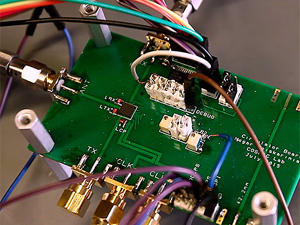



Date:29/04/16
 A team of Columbia Engineering researchers has invented a technology—full-duplex radio integrated circuits (ICs)—that can be implemented in nanoscale CMOS to enable simultaneous transmission and reception at the same frequency in a wireless radio. Up to now, this has been thought to be impossible: transmitters and receivers either work at different times or at the same time but at different frequencies.
A team of Columbia Engineering researchers has invented a technology—full-duplex radio integrated circuits (ICs)—that can be implemented in nanoscale CMOS to enable simultaneous transmission and reception at the same frequency in a wireless radio. Up to now, this has been thought to be impossible: transmitters and receivers either work at different times or at the same time but at different frequencies.
CoSMIC (Columbia high-Speed and Mm-wave IC) Lab full-duplex transceiver IC that can be implemented in nanoscale CMOS to enable simultaneous transmission and reception at the same frequency in a wireless radio.
In the era of Big Data, the current frequency spectrum crisis is one of the biggest challenges researchers are grappling with and it is clear that today's wireless networks will not be able to support tomorrow's data deluge. Today's standards, such as 4G/LTE, already support 40 different frequency bands, and there is no space left at radio frequencies for future expansion. At the same time, the grand challenge of the next-generation 5G network is to increase the data capacity by 1,000 times.
So the ability to have a transmitter and receiver re-use the same frequency has the potential to immediately double the data capacity of today's networks. Krishnaswamy notes that other research groups and startup companies have demonstrated the theoretical feasibility of simultaneous transmission and reception at the same frequency, but no one has yet been able to build tiny nanoscale ICs with this capability.
The biggest challenge the team faced with full duplex was canceling the transmitter's echo. Imagine that you are trying to listen to someone whisper from far away while at the same time someone else is yelling while standing next to you. If you can cancel the echo of the person yelling, you can hear the other person whispering.
New technology may double radio frequency data capacity
 A team of Columbia Engineering researchers has invented a technology—full-duplex radio integrated circuits (ICs)—that can be implemented in nanoscale CMOS to enable simultaneous transmission and reception at the same frequency in a wireless radio. Up to now, this has been thought to be impossible: transmitters and receivers either work at different times or at the same time but at different frequencies.
A team of Columbia Engineering researchers has invented a technology—full-duplex radio integrated circuits (ICs)—that can be implemented in nanoscale CMOS to enable simultaneous transmission and reception at the same frequency in a wireless radio. Up to now, this has been thought to be impossible: transmitters and receivers either work at different times or at the same time but at different frequencies.CoSMIC (Columbia high-Speed and Mm-wave IC) Lab full-duplex transceiver IC that can be implemented in nanoscale CMOS to enable simultaneous transmission and reception at the same frequency in a wireless radio.
In the era of Big Data, the current frequency spectrum crisis is one of the biggest challenges researchers are grappling with and it is clear that today's wireless networks will not be able to support tomorrow's data deluge. Today's standards, such as 4G/LTE, already support 40 different frequency bands, and there is no space left at radio frequencies for future expansion. At the same time, the grand challenge of the next-generation 5G network is to increase the data capacity by 1,000 times.
So the ability to have a transmitter and receiver re-use the same frequency has the potential to immediately double the data capacity of today's networks. Krishnaswamy notes that other research groups and startup companies have demonstrated the theoretical feasibility of simultaneous transmission and reception at the same frequency, but no one has yet been able to build tiny nanoscale ICs with this capability.
The biggest challenge the team faced with full duplex was canceling the transmitter's echo. Imagine that you are trying to listen to someone whisper from far away while at the same time someone else is yelling while standing next to you. If you can cancel the echo of the person yelling, you can hear the other person whispering.
Views: 627
©ictnews.az. All rights reserved.Similar news
- The mobile sector continues its lead
- Facebook counted 600 million active users
- Cell phone testing laboratory is planned to be built in Azerbaijan
- Tablets and riders outfitted quickly with 3G/4G modems
- The number of digital TV channels will double to 24 units
- Tax proposal in China gets massive online feedback
- Malaysia to implement biometric system at all entry points
- Korea to build Green Technology Centre
- Cisco Poised to Help China Keep an Eye on Its Citizens
- 3G speed in Azerbaijan is higher than in UK
- Government of Canada Announces Investment in Green Innovation for Canada
- Electric cars in Azerbaijan
- Dominican Republic Govt Issues Cashless Benefits
- Spain raises €1.65bn from spectrum auction
- Camden Council boosts mobile security





















